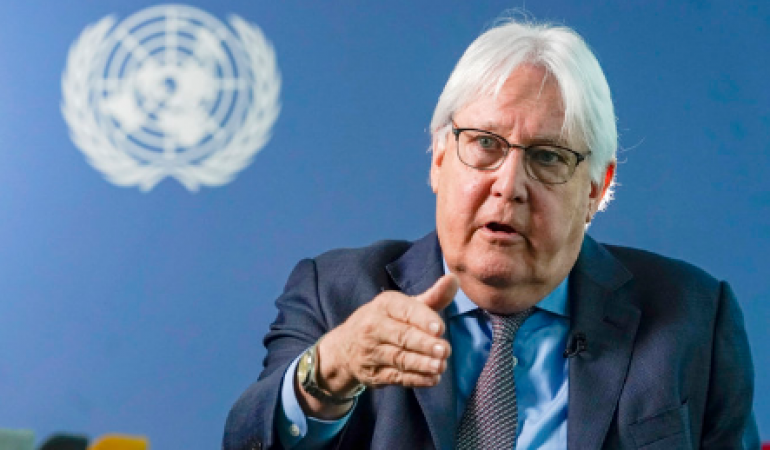
UNO: The top aid official for the U.N. warned on Friday that the humanitarian situation in Ukraine is "hugely worse" than it was before the Kakhovka dam collapsed.
An "extraordinary" 700,000 people, according to Undersecretary-General Martin Griffiths, need access to clean water, and he warned that the effects of flooding in one of the world's major breadbaskets will almost certainly result in lower grain exports, higher food prices globally, and fewer meals for millions of people in need.
He told The Associated Press in an interview that "this is a viral issue." The truth is that we are just now starting to see the effects of this act.
The Kakhovka hydroelectric dam broke and its reservoir on the Dnieper River was emptied on Wednesday, adding to the misery in a region that has endured artillery and missile attacks for more than a year.
The western bank of the Dnieper is held by Ukraine, and Russian forces are in charge of the low-lying, more flood-prone eastern bank. The dam and reservoir are located in the Kherson region, which Moscow illegally annexed in September and has been occupying for the past year. It is crucial for fresh water and irrigation in southern Ukraine.
According to Griffiths, the UN has reached 30,000 people in areas under Ukrainian control that have been inundated by working primarily through Ukrainian aid organisations. He claimed that so far, Russia has refused to allow the United Nations access to the territory it manages in order to aid flood victims.
Griffiths claimed that he met on Wednesday with Vassily Nebenzia, Russia's U.N. ambassador, to request access from the Russian government "for our teams in Ukraine to go across the front lines to give aid, to provide support for... Ukrainians in those areas." He continued, "I hope that will come through."
Also Read: Attack on northern Mali results in the deaths of 8 seriously injured UN peacekeepers
The emergency response is crucial to saving lives, he said, "but behind that you've got a huge, looming problem of a lack of proper drinking water for those 700,000 people" on both the Ukrainian-controlled and Russian-controlled sides of the river.
Additional issues include the flooding of significant agricultural land and the impending challenge of providing cooling water for the largest nuclear power plant in Europe, Zaporizhzhia, which had been supplied by the dam.
Griffiths also pointed out that waters have rushed over areas where land mines from the conflict still remain, endangering both adults and children. "We are bound to be seeing those mines floating in places where people don't expect them," Griffiths said.
Accordingly, he explained, "it's a cascade of issues, starting with allowing people to survive today, and then giving them some kind of prospects for tomorrow."
Griffiths claimed that because of the extensive effects, "it's almost inevitable" that the UN will issue a special appeal for additional aid funds for Ukraine to deal with "a whole new order of magnitude" as a result of the dam's rupture. However, he stated that he wants to hold off on making the appeal for a few weeks to assess the effects on the economy, public health, and the environment.
The Black Sea Grain Initiative, which Turkey and the U.N. mediated with Russia and Ukraine last July to open three Black Sea ports in Ukraine for its grain exports, is being extended, according to Griffiths and U.N. trade chief Rebeca Grynspan.
A memorandum between Russia and the U.N., which was a component of that agreement, was written to remove obstacles in the way of Russian food and fertiliser shipments, which Moscow has repeatedly claimed are not being carried out.
Reopening a pipeline that has been closed since Russia's invasion of Ukraine on February 24, 2022, between the Russian port of Togliatti on the Volga River and the Black Sea has been a key Russian demand. It contained ammonia, an important component of fertiliser.
We all consider it a top priority to open that pipeline and transport ammonia across the Black Sea to the developing world, Griffiths said. "A key component for ensuring the security of the world's food supply is ammonia."
Also Read: Colombian authorities discover four children who had been missing for 40 days after a plane crash
Late on Tuesday, there was a report of a pipeline rupture caused by shelling, but Griffiths said the U.N. couldn't confirm it because the pipeline is located in the middle of a conflict area.
We naturally hold the firm belief that we must have that fixed as soon as possible, he added. So, let's hope the damage isn't too severe